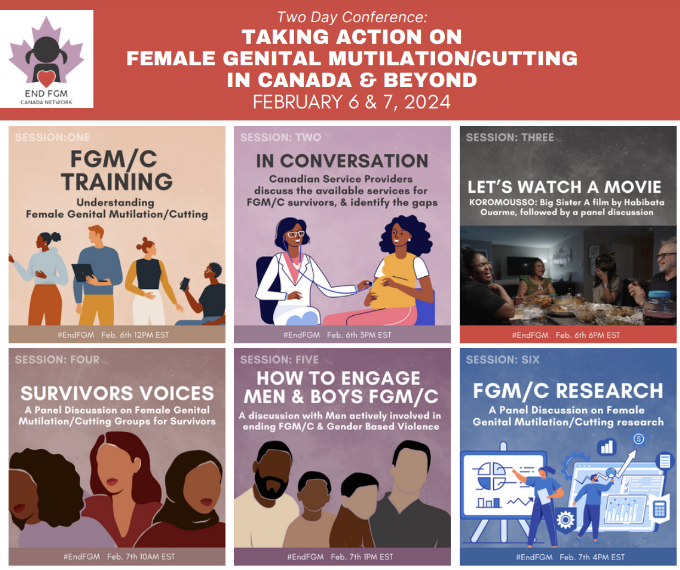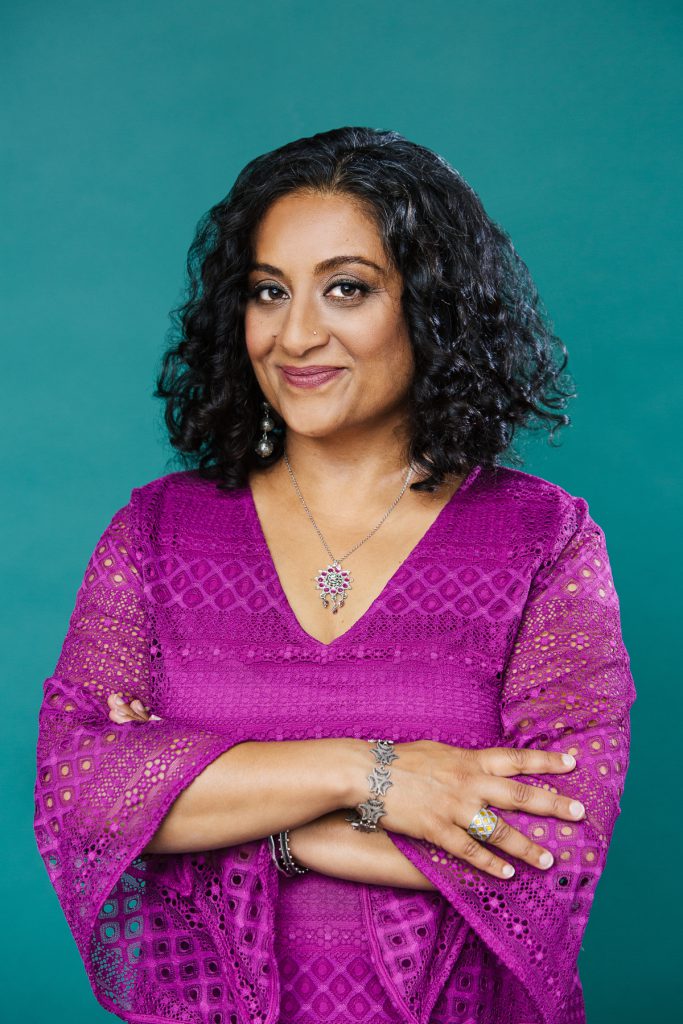Upcoming conference on ending FGM/C in Canada

On February 6th & 7th, the End FGM Canada Network will be hosting a conference, Taking Action on Female Genital Mutilation/Cutting in Canada & Beyond. This conference aims to observe February 6th, The International Day of Zero Tolerance for Female Genital Mutilation, through two days of collective action. Sahiyo U.S. Executive Director Mariya Taher will be a panelist for the fourth session: Survivors Voices: A Panel Discussion on Female Genital Mutilation/Cutting for Survivors on Feb 7th at 10 am EST. The Network invites participants to join in taking a deep dive into the issue of female genital mutilation/cutting (FGM/C) and develop the understanding and skills needed to support FGM/C survivors and contribute to Canada’s anti-FGM/C movement. Learn more about the conference here.
Exploring Canadian physicians’ experiences providing FGC-related care

By Kiah Leone As countries like the United States, Canada, Australia, and others become increasingly aware of the practice of female genital cutting (FGC) and its presence in their country, their healthcare systems are having to explore what support and quality services for survivors of FGC entail. Medical studies conducted across many of these countries have identified a significant lack of knowledge on behalf of healthcare workers when it comes to the practice of FGC. This lack of understanding regarding the practice, particularly the various sociocultural contexts within which it is perpetuated, can often leave survivors confronted with a healthcare system ill equipped to meet their particular needs. Unfortunately, instances of discrimination and stigmatization are not uncommon as a result, and such instances may cause survivors to feel discomfort, judgement, embarrassment, and fear in medical contexts, or to avoid seeking medical help and attention altogether. As part of my graduate degree in Social Anthropology, I decided to investigate the experiences of medical professionals in Canada as they navigated appropriate and culturally competent care for survivors. In 2018, I conducted a qualitative study with interviews of Canadian physicians and health care providers who had provided reproductive health care to survivors in Canada. The purpose of this study was not only to gain a deeper understanding of the role of physicians and medical personnel in providing reproductive health care to survivors of FGC, but to also learn how FGC was thought about, both within the Canadian healthcare system and in Canada as a whole. Interviews with medical professionals consisted of a series of questions regarding their level of education and training, experiences providing reproductive health care, knowledge of FGC and how they first came to learn about it, as well as their experiences providing care specifically for survivors. From these interviews, four major themes emerged: a lack of education and training amongst health care personnel in regards to FGC; reliance upon repeated encounters with survivors in order to develop a form of expertise in FGC-related care; a desire amongst participants to educate past, present, and future health care professionals on the practice of FGC; and the belief that FGC is an important topic of concern for reproductive health care specialists in Canada. What stood out across each of these themes was an emphasis on the importance of understanding FGC, rather than just learning how to accommodate survivors within a medical context. The physicians and health care providers who participated in my study all recognized the value and importance of education, training, and mentorship in the medical and health care concerning FGC in Canada. Providers explored the benefits of education and training, not only for their current and future medical students and residents, but also for their colleagues and peers to account for the diverse needs of their patients. From this study, I concluded that by continuing their own learning, making recommendations, and implementing education initiatives that provide early learning opportunities for others, Canadian health care professionals can improve the quality of care that survivors receive here in Canada. Kiah Leone (she/her) is a Doctoral Candidate in the School of Health Sciences and an Instructor for the Department of Anthropology at the University of Northern British Columbia (UNBC). Kiah’s research interests focus on improving female genital cutting (FGC) survivors’ experiences in accessing quality health care in Canada. She received her MA in Social Anthropology from York University and her BA in Anthropology from Vancouver Island University. Kiah is currently undertaking a study on the introduction of clitoral reconstructive surgery in Canada.
SEVEN, the first novel of its kind to address female genital cutting in the Bohra community, releases this month

SEVEN is being released in North America this September (Sept 5 Canada/Sept 29 U.S.). The novel sensitively addresses women’s relationships, sexuality, infidelity, intergenerational violence, religion and healing sexual trauma within the context of the Dawoodi Bohra (sub-sect of Shia Islam) community. This is the first novel of its kind to address female genital cutting in the Bohra community. Farzana is an engaging speaker on all of the above themes and issues. About SEVEN: When Sharifa accompanies her husband on a marriage-saving trip to India, she thinks that she’s going to research her great-great-grandfather, a wealthy business leader and philanthropist. What captures her imagination is not his rags-to-riches story, but the mystery of his four wives, missing from the family lore. She ends up excavating much more than she imagined. 2016 is a time of unrest within her insular and conservative religious community, and there is no escaping its politics. A group of feminists is speaking out against khatna, an age-old ritual they insist is female genital cutting. Sharifa’s two favourite cousins are on opposite sides of the debate and she seeks a middle ground. As the issue heats up, Sharifa discovers an unexpected truth and is forced take a position. In an era of #MeToo, Doctor brings us a soulfully written book about inheritance and resistance. Sahiyo is giving away a copy of SEVEN to a lucky recipient! Sign up for our newsletter to find out how! About the author: Farzana Doctor is an award-winning writer, activist, and psychotherapist. She is the author of four novels: Stealing Nasreen, Six Metres of Pavement, All Inclusive, and the forthcoming Seven. Farzana was recently named one of CBC Books’ “100 Writers in Canada You Need To Know Now.” She is a founding member of WeSpeakOut. SEVEN has already received excellent advance praise: “A brave and beautiful novel.”—Judy Rebick, author of Heroes in My Head “Seven is an intimate, gutsy feminist novel that exposes the lasting, individual impacts of making women’s bodies fodder for displays of religious obeisance.”—Michelle Anne Schingler, FOREWORD Reviews “Penetrating and subtle, SEVEN deftly explores loyalty in changing times, what it means and what you give up to be a part of a community, a marriage, and friendships. Sharifa is a sympathetic everywoman; her relationships fully realized and deeply felt in this immersive, absorbing portrait.”—Eden Robinson, author of Son of a Trickster and Trickster Drift. “A defiant and engrossing novel.”—Sarah Schulman, author of Conflict is Not Abuse. “In her grand tradition, Farzana Doctor once again pushes us forward with nuanced, layered, inter-generational prose, to bring visibility to an important social issue. An urgent and passionate read.”—Vivek Shraya, author of I’m Afraid of Men and The Subtweet Sign up for Sahiyo’s newsletter to win a copy of SEVEN!
Sahiyo participates in Canadian webinar on FGC

On May 23, the Canadian Partnership for Women and Children’s Health (CanWaCH) hosted a unique webinar to help Canadian social sector organisations get acquainted with the practice of Female Genital Cutting. As an organisation working to end the practice in India and other Asian countries, Sahiyo was invited to present some of its work during the webinar. CanWaCH is an Ottawa-based umbrella organisation with a focus on women’s health and gender equity. Its members come from across civil society, research and health sectors. The webinar on May 23 was for CanWaCH’s member organisations as well as the wider public, and it aimed to stimulate greater participation from Canadian NGOs, charities and institutions in the global movement to end FGC. Through presentations by various global organisations already working in the field of ending FGC, the webinar focused on sharing knowledge and best practices with the audience. Participants included Anne-Marie Kamanye and Peter Nguura from Amref, a CanWaCH member organisation that has anti-FGC programmes in Kenya, Tanzania and Uganda; Jenna Richards from Orchid Project, a UK-based organisation that supports anti-FGC partners in Senegal, Kenya and India, among others; Aarefa Johari from Sahiyo; and Alissa Koski from McGill University in Canada. Sahiyo shared information about the key elements required in an individual or organisation’s efforts to end FGC. Koski discussed the methods and challenges of conducting monitoring and evaluation of anti-FGC programmes.
FGC Articles & Research in Other Countries
FGC in Asia: Female Genital Mutilation and Cutting in Asia Remain a Neglected Problem FGC in Asia and the Middle East Map Following our report, Facebook removes ‘Islamic Female Circumcision’ page promoting FGM Report on Female Genital Mutilation in Dagestan Sparks Controversy in Russia Factbox: The hidden cut: female genital mutilation in Asia UNESCAP: Harmful Traditional Practices in Three Countries of South Asia: culture, human rights and violence against women Courageous Alumna Speaks Out for Maldivian Women A Truly Global Effort is Needed to Eradicate FGM by 2030 Activist push for end to female genital mutilation Southeast Asia’s Hidden Female Genital Mutilation Challenge Asia Network to End Female Genital Mutilation/Cutting Consultation Report FGC in Australia: Women Speak Out on Female Genital Mutilation in Australia Genital mutilation convictions overturned after new evidence showing victims remain intact High Court to hear appeal on female genital mutilation and prosecutors’ push for retrial High Court upholds NSW genital mutilation convictions FGC in Canada: Canada lifts silence on FGM It’s Time for Canada To Play Its Part In Ending Female Genital Mutilation FGM, A Bitter Reality: Canada Needs To Do More Female Genital Mutilation in Canada and the Limits to Criminalization FGC in Colombia: Female genital mutilation in Colombia more common than assumed: UN ‘Cut with a blade’: Colombia indigenous groups discuss FGM FGC and COVID: Is the Pandemic Causing a Surge in Female Genital Mutilation FGC in Egypt: Egypt: The Law and FGM FGC and Islam: Islam and female circumcision Muslim doctors against female circumcision Debunking the Myth that Islam Requires Female Genital Circumcision Unmuting the Tabooed: FGM and Muslim Women’s Rights FGC in Indonesia: Increasing understanding of FGC in Indonesia: A field study by Islamic Relief Canada A Cutting Tradition Ending Female Genital Mutilation in Indonesia Ending FGM/C through Education and Community Engagement FGC in Iran: Ending FGM in Iran Needs International Support Female Genital Mutilation practiced in Iran, study reveals The Changing Paradigms of FGM/C Russian clinic in row over female genital cutting FGC in Iraq: Changing Perceptions to End a Harmful Tradition in Northern Iraq FGC in Malaysia: Review fatwa on female circumcision, Putrajaya urged DPM maintains that female circumcision is part of Malaysian culture Stop female circumcision, it has no medical benefit, says women’s groups Female Genital Cutting in Malaysia: A mixed-methods study Malyasia’s anti-FGM advocates: Leave our bodies alone Malaysian Public Attitudes and Perceptions towards Violence Against Women FGC in Oman: FGM Study in Oman Shows High Prevalence All Over The Country FGC in Pakistan: ‘Something has been taken away’: Pakistan’s well-kept FGM secret Lack of Data and Dialogue on Female Genital Mutilation in Pakistan Violated Hopes: My Struggle to Report on Female Genital Cutting in Pakistan I Asked Bohri Women About Their Practice Of Female Genital Cutting Or Female “Khatna” And Here’s What They Had To Say Why is it so difficult to talk about female genital cutting in Pakistan? Pak former minister to initiate drive against female khatna in India and Pakistan FGC in Philippines: Pag-Islam: An Exploratory Action Research on Female Genital Mutilation/Cutting Practices in the Bangsamoro Region, Philippines FGC in Russia: Female circumcision in Moscow clinic sparks ‘complete shock’ Russia Furore over FGM in mainly Muslim Dagestan Activists Call For Investigation Into Cases of Female Genital Mutilation, Saying It Would Be A First For Russia FGC in Saudi Arabia: New Study Showing Scale of FGM in Saudi Arabia Surprises Rights Activists FGC in Singapore: Local movement against female genital cutting turns to Ramadan bazaars to advocate its cause “A Tiny Cut”: Female Circumcision in South East Asia – An Overview of FGC in Malay community Female genital mutilation: The women fighting against Singapore’s hidden human rights violation Ultra-modern Singapore’s dark secret: female genital mutilation FGC in Sri Lanka: Sri Lank-Culture: Mothers Watch as Daughters are Circumcised Stop FGM Middle East: Sri Lank Harmful Traditional Practices in Three Countries of South Asia: culture, human rights, and violence against women Sri Lanka should Criminalise the practice of female genital cut, activist tells CESCR 61 Butter knife or sharp blade? Either way, FGM survivors in Sri Lanka want it to stop Female circumcision in Sri Lanka is ‘just a nick’, not mutilation: supporters Lawyers and activists urge Sri Lanka to ban genital cutting FGM/FGC Victims speak out FGM in Sri Lanka: It’s never ‘just a nick’ Sri Lankan Islamic Centre condemns ban on female circumcision as ‘affront’ Towards Understanding Female Genital Cutting in Sri Lanka FGC in the United Kingdom: UK Serious Crime Act 2015 Legislation – FGM Fact Sheet Female Genital Mutilation: Legislation, policy, and guidance Dawoodi Bohras in London Told to Stop Female Circumcision Calls For Compulsory School Teaching Of FGM UK Home Office Multi-agency statutory guidance on FGM The Female Genital Mutilation Survivors Teaches Victims How To Enjoy Sex Vagina surgery ‘sought by girls as young as nine’ Perception and barriers: reporting female genital mutilation
FGM/C is neither beneficial nor relevant to modern times. Let’s end it

By Ali Asghar Akhtar Country: Canada Age: 33 I recently came to know about something very prehistoric (I am not being overdramatic, it was truly shocking for me). We are living in a digital, global, mobilized world where everyday living dynamics are being challenged and improved. Changes in technology, social norms, cultures, historic traditions and even daily mundane rituals have been drastic and entire paradigms have shifted. We term these changes as “progress”. However, when I recently learned that FGM/C (Female Genital Mutilation or Cutting) is still prevalent in today’s “modern era”, I was very surprised and shocked. I learned that FGC was still happening from one of my cousins living in the United States of America, who is a subject matter expert in this area. She told me that FGM is still practiced and in fact, in our community, many are very proud to keep our “traditions alive”. When I delved further on this subject, allowing for a benefit of doubt that it might be beneficial medically for women (as certain learning through religious teachings/beliefs have proved to be beneficial for mankind over the course of history), I learned that this practice has NO significant relevance medically or in terms of religion. This is simply a non-relevant practice which has traditionally been followed over the decades without any benefits. I was again very surprised to learn that no support group had ever challenged this unrealistic tradition until recently when a small group named SAHIYO was formed. I support this group to work towards ending this irrational and illogical tradition which should be banned. Continuous progress only happens when certain traditions are constantly reviewed, challenged, and improved. Progress is not limited to tangible outcomes. Social change and progress happen when attitudes change to help end harmful practices. I humbly request everyone who reads this snippet of information on FGM/C to become part of this organization and help Sahiyo stop this non-beneficial tradition. The existence of such bygone social norms is very perplexing to understand and relate to in today’s 21st century. Let’s together work to STOP FGM/C before it becomes a part of the next generation’s DNA.
Before sharing your khatna story, consider your country’s own legislation against FGC

Recently, a Sahiyo Volunteer asked us a very important question regarding sharing your khatna story and potential legal ramifications against a family. We always find it tremendously encouraging and inspiring for all those who do share their khatna story with us, but at Sahiyo we want those who share their stories to be made aware of any potential legal ramifications for sharing your story publicly. This information is in no way given to discourage you from sharing your story, and you should alway consult with a lawyer to gain more specific legal advice on this issue. However, at Sahiyo, our organization does seek to be transparent and honest with all those who connect with us. Could identifying as a Bohri who has been cut thru social media or media potentially lead to legal ramifications for family or friends who live in a country where FGC has been outlawed, and that country suddenly decides to crack down on it? ALL COUNTRIES: For more information on Female Genital Mutilation/Cutting Resources listed by Country where it is known to be an indigenous practice or by populations of refugees/immigrants – See more at http://www.refugeelegalaidinformation.org/female-genital-mutilation-grounds-seeking-asylum#countrylist CANADA: For more information, please refer to Dilshad Tavawalla’s blog post on Female Genital Mutilation or Khafd/Khafz or Khatna and Canadian Laws. You can also visit Ontario Human Rights Commission – FGM in Canada UNITED STATES: This is not a simple question. It will depend on 1) If a person was cut in 1995, then it was not a crime in the U.S. or any state because the federal law against FGM/C was passed and went into effect in 1996. 2) If the person was cut in 1997, but outside the U.S., the federal law was in effect, but only for FGM/C committed in the United States. Very few states had laws that early on to bring an FGM/C case. 3) If the person was transported from U.S. soil for the purposes of being cut and was cut abroad on or after November 2013, then the vacation cutting provision applies. 4) There is also the issue of statute of limitations. How long after the cutting can a criminal or civil case be brought under federal or state law? Is the Statute of Limitation “tolled” (put on hold or frozen) until the 18th birthday and then starts running? If yes, how long after the 18th birthday does the person or prosecutors have? 5) The federal law applies to both children and adults within its jurisdiction. The person who underwent FGM/C or someone legally allowed to act on their behalf would have to bring the charge or bring it to the attention of authorities who would bring the charge. That legal person could be a parent, guardian or court-appointed advocate. If you are concerned, ask the participants when and where the cutting took place to see if it was illegal in the United States. That’s a start. For more information, please refer to Equality Now’s Fact Sheet – Female Genital Mutilation in the United States. Disclaimer: No Legal Advice Intended. This blog includes general information and may reference topics on legal issues and developments in the law. Such materials are for informational purposes only and may not reflect the most current legal developments. These informational materials are not intended, and must not be taken, as legal advice or legal opinion on any particular set of facts or circumstances. You need to contact a lawyer licensed in your jurisdiction for advice on specific legal issues problems.
